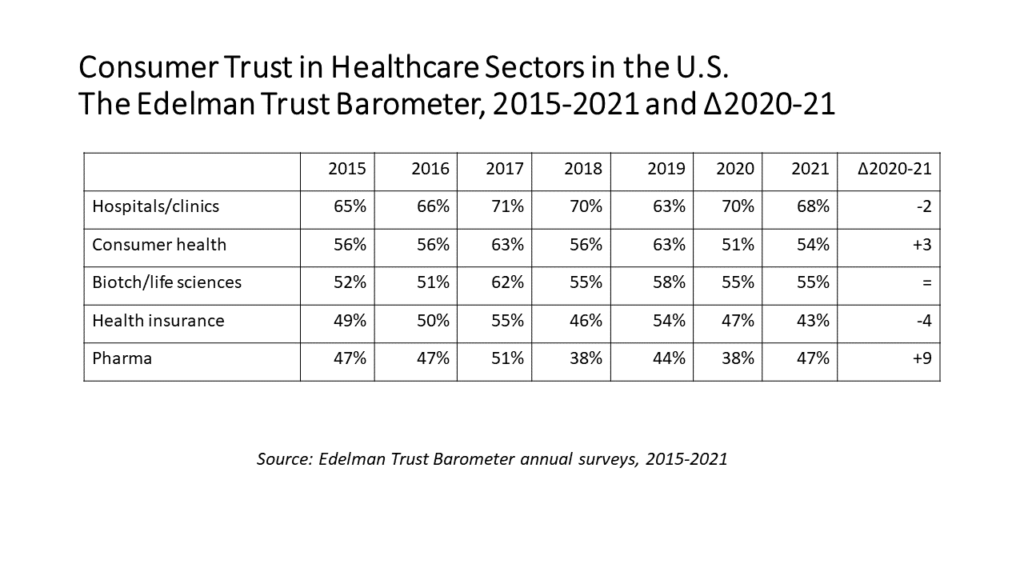
The COVID-19 pandemic put consumer trust to the test in 2020 and early 2021. Health economist Jane Sarasohn-Kahn shares how the healthcare industry can help rebuild trust among health citizens.
By Jane Sarasohn-Kahn, MA, MHSA
Trust in healthcare is under stress in America.
That’s a top-line finding in the 2021 Edelman Trust Barometer, which has assessed citizens’ trust across the globe for 21 years.
To be fair to the healthcare industry, it actually fared well when compared with other industries over the past year. The COVID-19 pandemic put consumer trust to the test. According to the Edelman report, trust declined across all sectors. (For a complete look at trust across various industries, view page 46 of the Edelman Trust Barometer PDF here.)
Although Americans lost trust in many industries over the past year, our trust in the healthcare industry has never been steady, often bouncing up and down for the overall sector. It’s important to look below that macro statistic to learn how health consumers’ trust-views have varied over time across the different industry segments that touch peoples’ health-lives.
Trust by Healthcare Segment
Edelman’s methodology defines the healthcare industry across five segments: hospitals and clinics, consumer health, biotech and life science, health insurance, and pharmaceutical.
Note that biotech is differentiated from pharma in this annual study, and that separation has yielded important perceptual differences even though the sectors have been blurring for several years. In the growing demand for vaccines and vaccination in this public health crisis, three of the pharma industry’s vaccine producers—AstraZeneca, Moderna, and Pfizer—became akin to consumer brand names in the pandemic. For example:
- Pfizer and AstraZeneca were among the top twenty fastest-growing brands in 2020, according to a Morning Consult study, joining the likes of Zoom, TikTok, and DoorDash.
- Moderna (#3) and Pfizer (#7) were two of the top 10 brands by reputation in the 2021 Axios Harris Poll. These two drug companies kept company with other well-loved brands such as Patagonia, Chick-fil-A and Amazon, among others.

Owing to the search for an end to the pandemic, in 2020, the pharma industry gained the most points of increasing trust in the U.S., followed by the consumer health sector (think: retail pharmacy, over-the-counter drugs, and the stuff we could buy in grocery and Big Box stores to make health at home during the pandemic).
Trust in hospitals fell two percentage points, and health plans by four points. Hospitals have been recovering trust since losing seven percentage points between 2018 and 2019, about the time that surprise medical billing gained significant media attention.
In the U.S., 60% of people polled in the Edelman study said that improving our healthcare system is more important now than it was one year ago. This grew in importance by 51 points compared with the results from the 2020 Trust Barometer survey.
The next biggest gains in issues more important this year than last were seen in big increases in consumers calling out addressing poverty in this country and improving our education system. Each of these issues increased in importance to U.S. consumers by 53 points over the year.
Furthermore, the group of Americans citing the growing importance of addressing discrimination and racism grew by 33 percentage points.
Interestingly, these “non-healthcare” issues are central to peoples’ social determinants of health: the factors outside of the healthcare system that directly impact peoples’ overall health status and well-being.
Prioritizing “my family and their needs” also grew in importance in 2021 by a factor of 47 points, from a low of 10 points in 2020.
Trust in Business and Employers … Especially Local Ones
Across these societal challenges, people say business now outperforms government, whether improving the healthcare system, responding to health and public safety aspects of the COVID-19 pandemic, driving economic growth and job creation, guarding information quality, or addressing systemic inequities.
Everyone of these challenges is healthcare’s “business.”
Business, broadly defined, is expected to fill the void left by government when it comes to fixing societal problems. of people said CEOs should take the lead to change. In addition, 2 in 3 people in the U.S. believe that CEOs should hold themselves accountable to the public and not just to the board of directors or shareholders.
Healthcare, Heal Thyself
This plotline on healthcare-trust-in-crisis-in-America prompts a timely and inspiring call-to-action: the opportunity for the healthcare industry to heal our sector.
Healthcare’s ace in the trust-hole is the fact that year-after-year, the annual Gallup Poll reveals Americans rank nurses, physicians and pharmacists at the top for honesty and ethics.
In America, we expect business to act on our most challenging societal issues, bestowing even greater trust in more local private sector stakeholders such as hospitals, health plans, medical practices, and health-embedded colleges and research institutions. (For example, “scientists” rank highest in societal leaders most likely trusted, especially when they are “local.”)
One business segment stepping up to play a role in public health is the consumer health segment. When CVS/pharmacy quit selling tobacco in its retail pharmacy stores, the company re-branded as CVS Health, going smoke-free and working to lower the health risks of their customers.
When Dick’s Sporting Goods and Walmart chose to stop selling certain forms of ammunition, they took a stand in the epidemic of gun violence in America. And during the COVID-19 pandemic, we benefited from many public health campaigns launched by private sector companies such as P&G and Unilever promoting handwashing, and Anheuser-Busch repurposing brew facilities to manufacture hand sanitizer.
In these instances, promoting public health was also good for business in terms of bolstering their social missions and corporate reputations. Together, these help bolster trust among health citizens.
“As trust in healthcare has declined, alternative sources of information have arisen to challenge and even supplant rigorous scientific knowledge and experience—sources that are accessible on a variety of platforms that make little effort to validate their medical claims. Such information, be it true or false, can have a powerful and potentially dangerous impact on patients. The stubborn persistence of anti-vaccination messages in the face of overwhelming evidence of vaccine safety is a case in point.”
That statement was written in September 2019 by Dr. Richard Baron, the president and CEO of the American Board of Internal Medicine, and published in the American Journal of Accountable Care. Of course, that was just a few months before COVID-19 emerged in the United States, but Dr. Baron had already pointed out the growing anti-vaccination sentiment.
Dr. Baron continued to be very prescient in concluding his essay on patients’ eroding trust in U.S. healthcare. He recognized that, “Rebuilding trust within our healthcare system and nurturing an ecosystem in which trust is a core operating principle requires a more comprehensive and sustained effort. It can’t just be physicians and patients. We need everyone.”
Senator Thomas Philips “Tip” O’Neill of Massachusetts used to say that “all politics is local.” Healthcare providers, plans and systems have the opportunity to play their “local” card to help rebuild trust in their target markets with local health citizens and the families they grew to prioritize during the pandemic. Our nurses, physicians and pharmacists, the most trusted professions in America, along with science-trained leaders in health systems, can be the carriers of the healthcare trust flame.


About The Author: Jane Sarasohn-Kahn, MA, MHSA
Through the lens of a health economist, Jane defines health broadly, working with organizations at the intersection of consumers, technology, health and healthcare. For over two decades, Jane has advised every industry that touches health including providers, payers, technology, pharmaceutical and life science, consumer goods, food, foundations and public sector.
More posts by Jane Sarasohn-Kahn, MA, MHSA